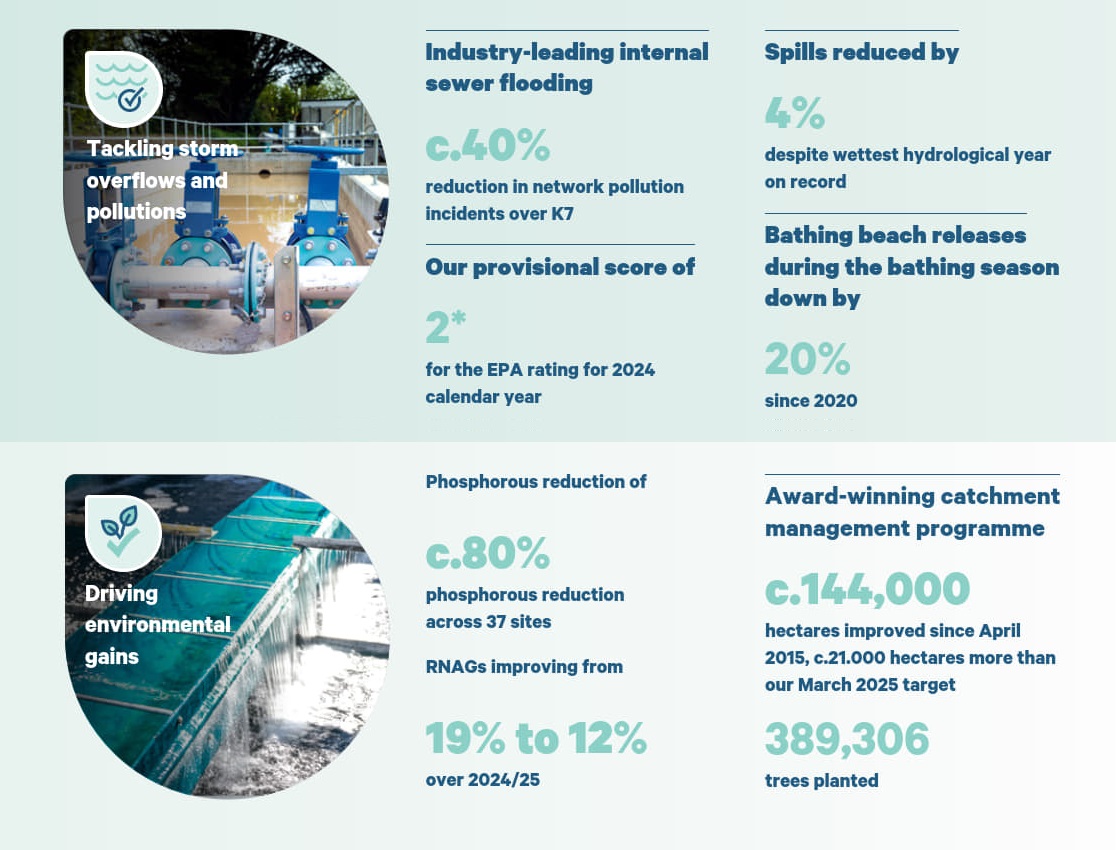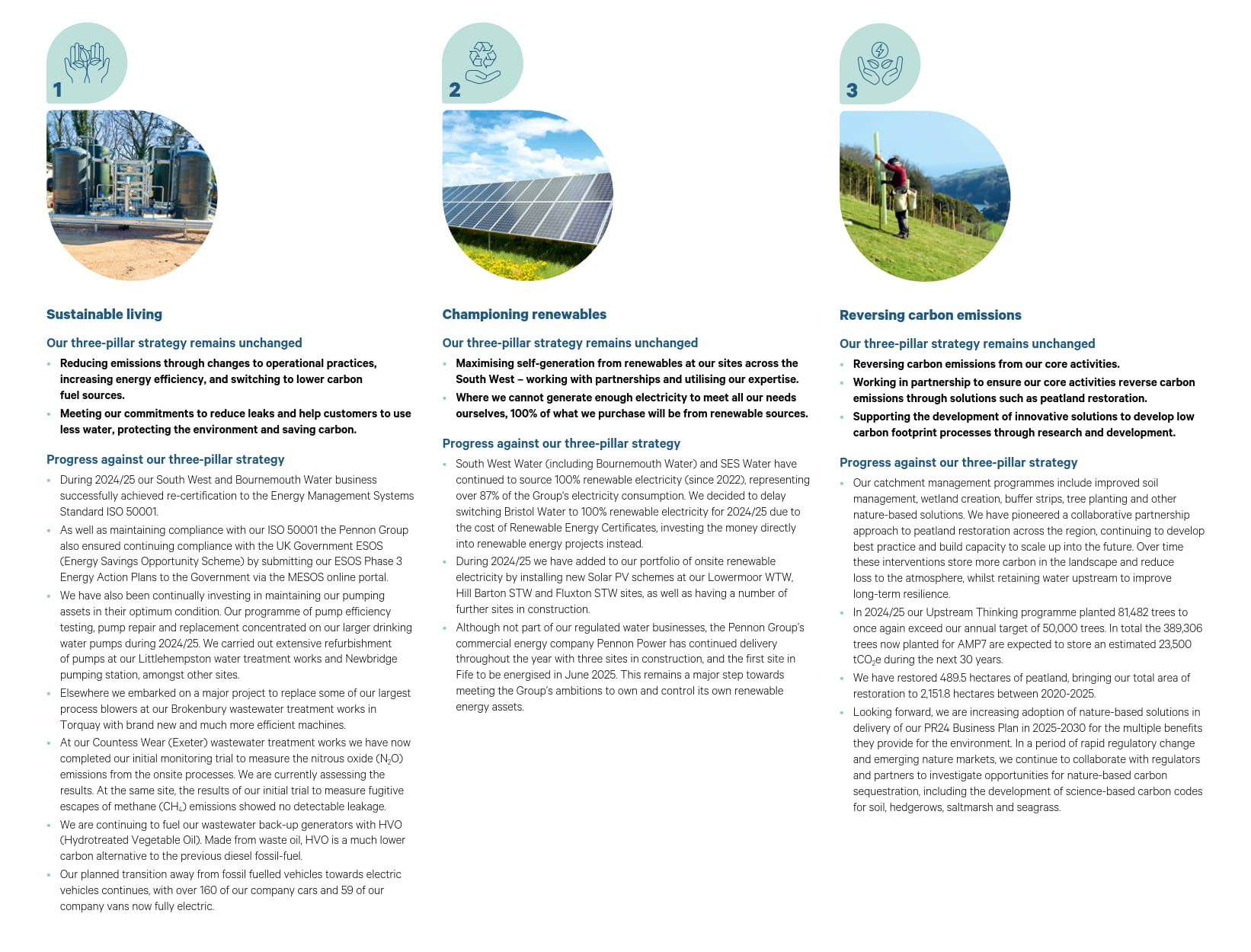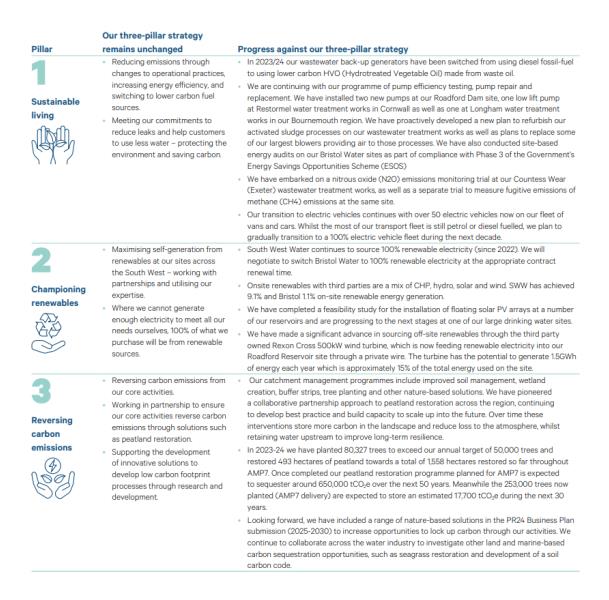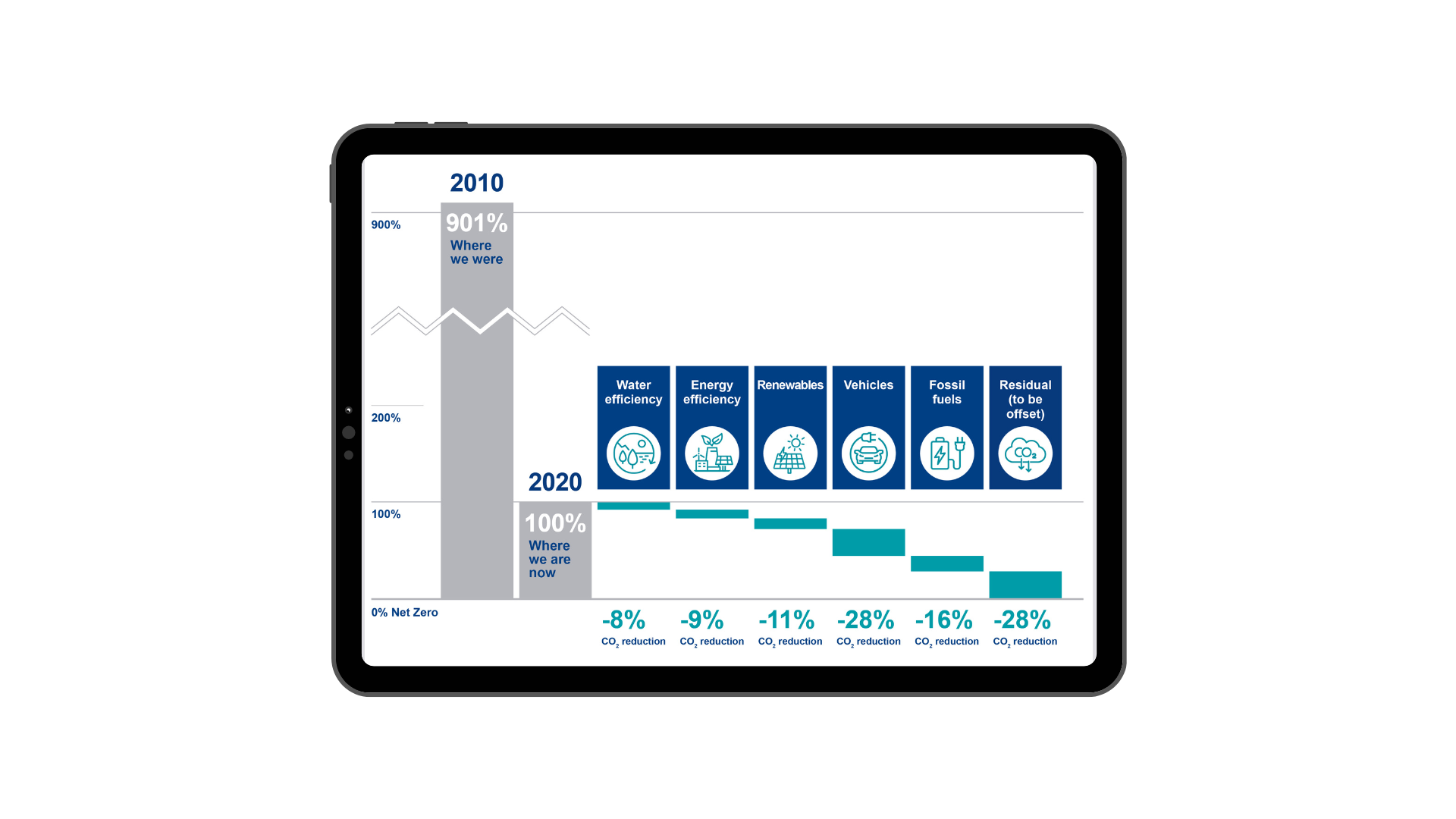Our purpose is to protect and enhance the environment for generations to come. As a business so closely associated with the environment, we are very aware of our environmental impact and obligations. We recognise that the abstraction, treatment and delivery of clean, safe drinking water, and the removal and safe disposal of wastewater all have implications for river and sea water quality, and we understand that the scale of our operations brings with it a scale of responsibility in how we manage our operational activities.
Our environmental commitments are set out within our Group Environmental Policy.
We rely upon the natural environment to deliver for customers and communities, and our achievements this year have been delivered against a backdrop of some challenging weather conditions, with a record wet year.
With record levels of investment earmarked to 2030, we remain focused on our key priorities, informed by our customers and stakeholders. areas we know they truly value.
Two of our four priorities are focused on our environment; tackling the use of storm overflows at our beaches and reducing pollutions, and driving environmental gains.

Read more about the progress made against these key priorities in our Annual Report and Accounts 2024/25 here.
BREEAM
Pennon’s head office Peninsula House was refurbished to BREEAM Very Good standard in 2011. Our certificate can be found here.
For our further details of our performance across a range of environmental metrics, read more in our ESG Databook
Environment - Reducing our Environmental Impact
- Net Zero
- Climate Change
- Air Emissions
- Water management
- Effluent Management
- Waste Management
- Hazardous Waste
- Biodiversity
In 2021, we published our Promise to the Planet – our ambitious plan to reduce our operational carbon emissions to Net Zero by 2030. During 2024/25 we have continued to make progress towards our goal of decarbonising our operational activities.
Our Net Zero strategy is driven by three pillars; Sustainable living, Championing renewables, and Reversing carbon emissions.

As a Group we have committed to near-term Science Based Targets (SBTs). Our targets were validated and approved by the Science Based Targets Initiative in May 2024 and we will now focus on delivering our targets. SBTs provide a clearly defined pathway for companies to reduce greenhouse gas emissions. Targets are considered ‘science-based’ if they are in line with what the latest climate science deems necessary to meet the goals of the Paris Agreement – limiting global warming to 1.5°C above pre-industrial levels. Our SBTs, presented below, support our water and wastewater greenhouse gas, and embodied carbon bespoke performance commitments.
- The Group commits to reduce absolute scope 1 and scope 2 GHG emissions 68% by 2032/33 from a 2021/22 base year.
- The Group commits to reduce absolute Scope 3 GHG emissions from 'well to tank' electricity and fuels, the delivery of electricity, emissions from waste, and business travel and commuting, by 30% over the same timeframe.
- The Group commits that 60% of its suppliers by emissions covering purchased goods and services, capital goods and upstream transportation and distribution will have science-based targets by FY2027/28.
- The Group commits to increase annual sourcing of renewable electricity to 100% by 2030.

Each of our regulated water businesses have published their Net Zero 2030 plans on their company websites.
For more details of our progress towards Net Zero, please see our Annual Report and Accounts 2024/25
GHG Emissions
Our greenhouse gas (GHG) emissions are reported in our Annual Report with further details including Scope 3 GHG emissions breakdown in our ESG Databook
South West Water, Bristol Water and SES Water are active members of trade organisation Water UK which we engage with collaboratively to help tackle climate-related issues including the development of the industry Net Zero 2030 routemap. Additionally, our teams are engaged in UKWIR’s water industry research programme including projects towards UKWIR’s big question: How Do We Remove More Carbon Than We Emit By 2050?
Carbon in decision-making and internal carbon price
We use carbon pricing within our plans and decision making. For K8, we are carrying out whole life assessments for capital projects using a carbon cost of £294/tCO2e, and are working with our Amplify supply chain partners to embed this value. The carbon cost adopted aligns to the 2030 carbon values published by the Department for Energy Security and Net Zero (DESNZ), in the Treasury’s Green Book.
Our Transition Plans
At Pennon, we recognise the need to transition to a low-carbon economy in alignment with the goals of the Paris Agreement and a 1.5°C future, to help protect our beautiful environment across the Great South West and beyond.
As a leading provider of the UK’s clean water and wastewater services, we are committed to delivering a resilient and sustainable future. Our near-term GHG targets were validated and approved by the Science Based Targets Initiative (SBTi) in May 2024, and we are now focused on delivering against these ambitious targets.
Science Based Targets (SBTs) provide a clearly defined pathway for companies to reduce greenhouse gas emissions. Targets are considered ‘science-based’ if they are in line with what the latest climate science deems necessary to meet the goals of the Paris Agreement – limiting global warming to 1.5°C above pre-industrial levels.
We are working beyond our regulatory commitments to consider the Transition Plan Taskforce’s (TPT) guidance for Climate Transition Plans in our annual reporting, and remain committed to building on our transition plans as we continue making progress towards net zero.
Climate adaptation
Assessing climate change risk and any potential impacts and possible mitigations on our various operations, assets and networks, is an ongoing process.
In December 2024, we published our latest climate change adaptation report as part of the UK government’s fourth adaptation reporting cycle. This feeds into the next UK Climate Change Risk Assessment and National Adaptation Programme and details what actions we are undertaking to ensure that we are adapting to any emerging climate change risks.
We have already made good progress in mitigating the impacts of climate change, but in response as risks develop over time we need to continually monitor and review our plans. Collectively these plans are driven through:
- South West Water, Bristol Water and SES Water - Water Resource Management Plans for the next 25 years.
- South West Water - Drainage and Waste Water Management Plan for the next 25 years.
- South West Water, Bristol Water and SES Water - five-year business plan covering the period 2025-2030.
Each of these plans can be found on the relevant company website, as below:
For further details of how our business is preparing for climate change please see our latest Climate Change Adaptation Report
We are core members of the Water Resources West Country Water Resources group, established in 2017 to allow improved collaboration in water resources management in the South West of England.
Task Force on Climate-related Financial Disclosures’ (TCFD)

TCFD provides a framework setting out how businesses should integrate climate change risk and opportunities into their business strategy, governance, risk management and metrics and targets. Pennon support the Financial Stability Board Task Force on Climate-related Financial Disclosures’ (TCFD) recommendations that were introduced as mandatory reporting for 2022. Read our TCFD report for 2024/25.
At Pennon Group, we are committed to managing and reducing air emissions across all our operations. We monitor emissions in line with regulatory requirements and best practice, and we continue to invest in cleaner technologies and processes to reduce our impact on air quality.
Monitoring and Reporting
All our sites operate under strict environmental permit conditions set by our regulators, including the Environment Agency. Air emissions data is submitted to regulators as required, ensuring transparency and compliance.
We monitor a range of air pollutants across the Group, including nitrogen oxides (NOx), sulphur dioxide (SO2), volatile organic compounds (VOCs), and odorous emissions. These are reported annually in our ESG Databook 2024/25 to support transparency and track our performance over time.
For sites with standby generation, we conduct spot checks of stack emissions in line with the Medium Combustion Plant Directive (MCPD). We're also committed to meeting our environmental permits conditions under the Industrial Emissions Directive (IED), working with the Environment Agency to ensure compliance.
Air Emissions Reduction Initiatives
We are implementing a range of measures to manage and reduce air emissions:
- Odour Management: Odour emissions from wastewater treatment works are a key area of focus. In South West Water, we have installed real-time odour monitoring equipment and upgraded odour control systems at multiple sites. This supports our performance commitments and helps improve conditions for local communities.
- Fuel Alternatives: Aligned to our Net Zero ambition, we are using hydrotreated vegetable oil (HVO) biofuel for standby power generation at multiple sites. HVO is a lower-emission alternative to diesel, helping to reduce both greenhouse gas (GHG) emissions and our impact on local air emissions.
- Sustainable Fleet Transition: To reduce emissions from our transport activities, we are rolling out a fleet of low- and zero-emission vehicles, including over 50 electric vans. Charging infrastructure has been installed across many of our sites to support our fleet transition.
- Industry Collaboration: We continue to work with partners across the water sector to develop improved methods for monitoring and managing air pollutants from wastewater operations.
Water is a valuable natural capital asset and at the heart of our business. We strive to improve our own internal water efficiency in addition to promoting sustainable water usage to our customers, stakeholders and members of the public.
Building water resources and improving water quality is one of our four strategic priorities for 2025-2030. We are regulated for the environmental and efficient management of these activities with our performance reported annually to the regulators including through our regulated businesses Annual Performance Reports.
Water policy and targets
We have developed a Group-wide Water Management Policy, with the aim of reducing our own water footprint, enabling us to lead by example in water stewardship. The policy sets out to optimise water efficiency by encouraging employees to demonstrate best practice water-saving behaviours and to ensure that facilities are in place to monitor water consumption, reduce leakages, and enable employees to most efficiently use water. We are also investigating how we can further reduce and recycle water usage where possible throughout our operations.
Our capital investment of £3.2 billion across the regions we serve includes our base maintenance programme alongside an extensive enhancement programme, focused on delivering against our four priorities. These plans include:
- Upgrading one third of the water treatment works across our regions
- Renewing or replacing c.440km of water mains across our regions
- Lead pipes replacement for 38,000 customers, targeting 170 nurseries, schools and colleges in the SES region
- New strategic reservoir with Cheddar 2 in Bristol and a water re-use plant in Poole
- Reducing leakage by 19% in the South West region, and 14% in the Bristol and SES regions
Pennon Group is committed to reducing our own water consumption and assist our customers to reduce theirs too.
As a group:
- We conduct Water Audits in people’s houses to identify inefficiencies in their houses, fix leaky toilets and other internal water losses.
- We offer customers Leakbots which can help customers identify internal leaks and get these rectified.
- We continued to offer free water savings devices through our website and using the GetWaterFit platform.
- We conduct Water Efficiency Audits in non-households too, with leaks located and repaired.
- We give incentives to retailers to conduct water efficiency schemes with their customers.
- We have a Water Efficiency Fund of £75,000 where we invite charities and communities to apply for funding where their projects can save water use.
- We educate our young people and communities on the need to be more efficient with water use. This year we have engaged with over 13,250 children at various schools across our regions.
- Own-use water efficiency savings across the group have successfully reduced water use by over 13Ml/day across operational sites.
You can find more information on our personal water efficiency initiatives across each of our water businesses websites.
Water use monitoring and measurement
The vast majority of water extracted from the environment is for our customers which we define as indirect use. However, to operate the water network and assets, we use water for cleaning and flushing and additionally consume water within our own offices and facilities.
Our water use data can be found within the Water section of our ESG Databook.
Water stress
Water stress refers to the ability or lack of, to meet the human and ecological demand for water (GRI 20181). The ratio of total annual water withdrawal to total available annual renewable water supply (i.e., baseline water stress) is high (40-80%) or extremely high (>80%) (WRI2). According to this definition, none of our abstraction/withdrawal operations operate in water catchments of water stress within South West or Bristol Water. Several of our abstractions are within an area of high water stress within SES Water.
1GRI 303: WATER AND EFFLUENTS 2018 https://www.globalreporting.org/standards/
2World Resources Institute, Aqueduct Water Risk Atlas, www.wri.org/our-work/project/aqueduct/
Part of the function of a water and sewerage undertaker is to collect and treat wastewater and return it to the environment. Without treatment the wastewater from domestic and residential premises, industrial wastewater discharges to sewers and rainwater contaminated with metals, oils and other pollutants from run-off in urban areas draining to sewers, would have significant adverse impacts on the water environment. Effective treatment also means treated wastewater can be returned to the environment to maintain river flows for conservation, fisheries and recreational interests.
Like all water and wastewater companies, our investment programme and operational practices are required to adhere to strict regulatory controls, as set out by the Environment Agency. To safeguard river, shellfish and bathing water quality we aim to ensure the wastewater we return to the environment is treated to the required standards. All our discharges are permitted by the Environment Agency and it is these permits that set out the required standards and levels of treatment required to protect the environment.
South West Water is the regulator for industrial wastewater discharges to the public sewer. The company conducts careful checks before permitting any release into the sewer, and monitors compliance with those consents. This is designed to protect both our processes and the environment from harm by ensuring levels discharged to the sewer are safe, treatable and do not harm the integrity of the sewer.
Objectives and Targets
Our objectives and targets for effluent management are driven by environmental compliance to ensure the treated wastewater returned to the environment (discharge) meets the environmental standards agreed with our regulator. Our target is 100% compliance.
Our effluent management compliance performance can be found within South West Water's Annual Performance Report.
Tackling storm overflows and pollutions is one of our four strategic priorities for 2025-2030. Our capital investment of £3.2 billion across the regions we serve includes our base maintenance programme alongside an extensive enhancement programme, focused on delivering against our four priorities. These plans include:
- 291 overflow improvements – 100% of storm overflows at bathing waters addressed
- Adding over 250,000m3 of storage to capture rainfall and reduce overflows – 62% reduction targeted from 2023/24 levels
- Removing rainwater draining into our sewerage network by a volume equivalent to over 350 hectares
- Upgrading over 200km of our sewer network
Waste is generated by our business as a result of our operational activities, in particular sludge (biosolids) arising from the wastewater treatment process. We also encounter hazardous wastes including laboratory waste, waste from maintenance activities, waste electrical and electronic equipment, and surplus treatment chemicals. More reading on hazardous waste can be found under Hazardous Waste Tab.
We work with our key engineering contractors and partners to responsibly manage onsite environmental impacts and minimise resource use whilst maximising recycling and recovery of waste arisings. Environmental Management plans form part of our Construction Phase Plan supported Site Waste management Plans.
Examples of effective initiatives we have implemented with our contractors includes re-use of construction and demolition waste in new construction projects as illustrated as below;
- Reducing waste to landfill through innovative foundation design and the designing of prefabricated pipework to minimise cutting and waste on site.
- Surplus excavated material being used to re-landscape sites, including the utilisation of surplus material in the development of a wildflower meadow.
- Improving and repairing field access and tracks for landowners after projects have concluded utilising site generated and surplus materials.
- Surplus concrete was used to construct a bench base for a local parish council
- Segregation of waste for re-purposing and / or recycling. For example, brick and concrete material can be re-used to construct haul roads and sand from filters is tested and re-used during construction into the permanent works (bedding for ducting etc.)
- The promotion of “off-site builds” which maximise efficiency whilst reducing waste and reducing health & safety risks.
- Sustainable procurement, such as the use of Concrete with high GGBS or PFA content (waste product from coal power stations) and the use of recycled aggregates within concrete.
- Reinforcement and piles containing up to 100% recycled steel content while out ductile iron pipework contains >80% recycled material content
We have been working hard with our waste contractors over recent years to better understand our waste arisings from our engineering and construction activities and are proud of the steps taken to reach 99.4% of waste diverted from landfill, as reported in our ESG Databook.
We are committed to managing hazardous materials safely and in full compliance with all relevant environmental and waste management legislation, including Duty of Care obligations. This applies across all our operational sites, and we expect the same high standards from our suppliers.
Reducing hazardous waste initiatives
South West Water encounters hazardous wastes including surplus or out of specification treatment chemicals, trade effluent, laboratory waste, construction waste, and wastes generated from asset maintenance activities, all of which are safely handled and stored at our operational sites.
As the regulator for industrial wastewater discharges to the public sewer, we conduct careful checks before permitting any release into the sewer, and monitors compliance with those consents. This is designed to protect both our processes and the environment from harm by ensuring levels discharged to sewer are safe, treatable and do not harm the integrity of the sewer.
We also run behavioural and awareness campaigns with our customers about not putting the wrong things into the sewerage system. The award-winning Love your Loo and Think Sink campaigns target non-biodegradable materials to help prevent pollution incidents. We have also supported Water UK in its work with the Government and wet wipe manufacturers to avoid non-degradable and plastic-containing wipes from being marketed and sold as ‘flushable’, and to help get plastic microbeads prohibited from use in cosmetic products.
We are not permitted to accept any hazardous waste via third party tankered waste imports for treatment at wastewater treatment works. Company processes are in place to ensure compliance including pre-acceptance sampling and customer declaration, and data returns demonstrating compliance are made to the Environment Agency in accordance with the Environmental Permitting Regulations.
Hazardous waste reporting
Hazardous waste is collected from our operational sites. A breakdown of our most recent data is provided below. The waste types include those produced from equipment maintenance activities such as waste mineral oils and oily rags, clinical waste, and used electrical equipment and batteries (WEEE waste). The waste is categorised in accordance with the List of Wastes (England) Regulations 2005 and collected by our approved hazardous waste contractor. It is then sent on for further treatment and/or disposal in accordance with the Hazardous Waste (England and Wales) Regulations 2005.
Group Hazardous Waste generated can be found in our ESG Databook
There are significant areas rich in wildlife and biodiversity across and adjacent to Pennon’s operational sites and projects, including a number protected by law. We are committed to the protection, enhancement and sensitive management and stewardship of our landholdings and to contribute to the same across the landscapes and catchments in our operational areas, for the benefit of biodiversity and wildlife.
Pennon Group has created a Group-wide biodiversity strategy to provide a cohesive approach across the organization and build on existing excellent work within its businesses. The Group is committed to protecting, enhancing, and sensitively managing its landholdings, contributing to the same across landscapes and catchments in operational areas for the benefit of biodiversity and wildlife. Pennon's landholdings and operational areas hold significant biodiversity opportunities for enhancement through responsible stewardship. South West Water actively manages several conservation-designated landholdings through its partnership with South West Lakes Trust and is recognized for its innovative approach to managing invasive species.
South West Water plays a critical role in protecting and enhancing the region's natural environment through its 'source to sea' approach, favouring innovation, sustainable solutions, and partnership working to deliver positive outcomes for ecosystems and habitats. The company works to minimize its carbon footprint, improve raw water quality through its Upstream Thinking catchment management initiative, and continue improving biodiversity through environmental projects. Since 2010, South West Water has been working with local partners, farmers, and landowners to deliver its award-winning Upstream Thinking program, establishing relationships with key regional delivery partners.
To date, the Upstream Thinking approach has improved land management across 144,000 hectares, outperforming our 123,000-hectare target by 2024/25, achieved through initiatives across Exmoor, Dartmoor, and Bodmin Moor. Additionally, South West Water has restored 4,904 hectares of peatland (cumulative) and planted over 389,000 trees (cumulative), achieving its 2025 target a year early.
Pennon Group demonstrates its commitment to biodiversity and environmental stewardship through its biodiversity strategy, responsible landholding management, 'source to sea' approach, and the multi-award-winning Upstream Thinking program, aiming to improve water quality, biodiversity, climate resilience, and restore natural habitats.



